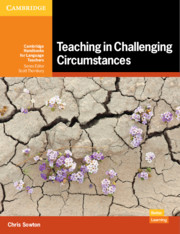Book contents
- Frontmatter
- Contents
- Thanks
- Acknowledgements
- Introduction
- I Creating a good environment for language learning
- II Being effective in the classroom
- III Teaching large classes
- IV Teaching language skills and systems
- V Teaching language without textbooks
- VI Teaching language with textbooks
- VII Helping students achieve their potential
- VIII Linking the school to the outside world
- IX Supporting yourself and others
- Glossary
- Index
Introduction
Published online by Cambridge University Press: 22 September 2021
- Frontmatter
- Contents
- Thanks
- Acknowledgements
- Introduction
- I Creating a good environment for language learning
- II Being effective in the classroom
- III Teaching large classes
- IV Teaching language skills and systems
- V Teaching language without textbooks
- VI Teaching language with textbooks
- VII Helping students achieve their potential
- VIII Linking the school to the outside world
- IX Supporting yourself and others
- Glossary
- Index
Summary
Washing one's hands of the conflict between the powerful and the powerless means to side with the powerful, not to be neutral.
Paulo FreireBackground to Teaching in Challenging Circumstances
The inspiration for Teaching in Challenging Circumstances is Michael West's Teaching English in Difficult Circumstances, a work which evolved out of his experiences as an educator in British India during the first half of the 20th century. Despite the six decades which have passed since its publication in 1960, many of his conclusions about English language learning in Bengal feel very familiar today, and there is much which we can learn from his experiences. He noted, for example, that despite students spending around ten hours a week on English study, very few students ‘had real reading ability in English, nor were they able to speak more than disjointed sentences, and they could write only very slowly and laboriously’, with the effect that their ‘results were extremely poor’. This state of affairs is instantly recognizable throughout the modern world, from Afghanistan to Zimbabwe, where millions of students are daily receiving a language education where both the outcome and experience is unsatisfactory.
West's response to the situation he found in Kolkata and beyond was to support teachers in developing a pragmatic, practice-oriented pedagogy. This approach prioritized practices such as the comprehensibility of input, the recycling of new language, and linking language learning with the wider curriculum. His emphasis on a more liberal, democratic form of education was radical in its time, and indeed he purposefully ‘stood away from and was opposed to the dominant beliefs and practices of his day’ (Smith, 2016). One such contentious area concerned the negative impact which an assessment-focused culture had on classroom practice. This pressure resulted in a situation where teachers ‘can't do what they want to do because it doesn't help students pass examinations’. Again, West's critique is as fresh and relevant today as it ever was.
For West, the role of the teacher is nuanced. One particular area which he was critical of was classroom performativity, that is, where the teacher ‘is thinking too much of what he does so as to impress the Supervisor rather than of what the pupils are doing’.
- Type
- Chapter
- Information
- Teaching in Challenging Circumstances , pp. 1 - 8Publisher: Cambridge University PressPrint publication year: 2021



